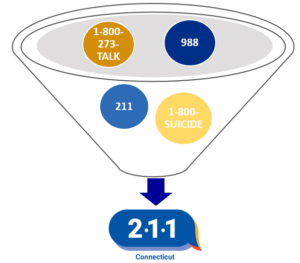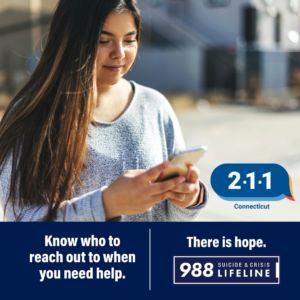988 CT
988/CT Statistics

During Fiscal Year 2024, 211 Connecticut handled 186,905 crisis calls.
- The 211 CT Crisis Team takes crisis calls from several numbers – including 988/CT, the DMHAS Action Line, mobile crisis calls for youth and others.
- In FY ’24, 92% of CT callers in crisis reported that their state of crisis diminished over the course of the call with the 211 CT Crisis Team.
- Less than 1% of CT callers required active rescue from emergency responders. The nationwide average is about 2%.
- Speed of answer is critically important for these calls: 211 CT crisis team answered 96% of 988 calls within 5 seconds. (Federal funding for 988 requires 95% of calls to be answered in 15 seconds.)
988/CT is a High Performer

CT consistently ranks among the top five highest in-state answer rates in the nation for 988 call centers receiving at least 2,000 calls per month.
- If local centers don’t answer calls, they are redirected to out-of-state overflow facilities.
211 Connecticut received the American Association of Suicidology’s (AAS) single 2022 Crisis Center Excellence Award for the nation. (AAS serves as the accrediting body for crisis call centers.)
Federal And State Funding Of 988
- The Substance Abuse and Mental Health Services Administration (SAMHSA) launched 988 nationwide on July 16, 2022, as a new, easy-to-remember Suicide and Crisis Lifeline.
- United Way of Connecticut 211 has provided the National Suicide Prevention Lifeline service (now the 988 Suicide and Crisis Lifeline) for more than 40 years, in close partnership with the Department of Mental Health and Addiction Services (DMHAS).
- Since the launch of 988 in July of 2022, 211 Connecticut has seen a significant increase in 988/NSPL calls. Between FY ’23 and FY ’24, CT experienced an increase of 32%.
- We are pleased that – to date – our resources have been adequate to enable the high levels of service that we have provided.
- UWCT launched in-state chat and text service on February 6, 2024, to serve more CT residents locally, especially younger people in crisis.
- If volume continues to increase at current rates, an increased investment will be required to provide the same level of excellent service to Connecticut residents.
Connecticut’s Crisis System
CT has a particularly effective crisis service systems thanks to years of system design work together with DMHAS and the Department of Children and Families (DCF) to simplify access to mobile crisis services for youth and adults.
- 211 Connecticut serves as the front door for mobile crisis, eliminating the need to memorize multiple phone numbers.
- Callers in crisis benefit from consistent triage, shared data collection and seamless connection to mobile clinicians 24/7.
- Connecticut has received inquiries from other states interested in this innovative service delivery model.
In addition to the telephone crisis intervention services provided by the 211– contact specialist, when appropriate, 211 CT offer callers referrals to community resources from 211 Connecticut’s community resource database.
- Our database is the state of Connecticut’s most comprehensive database of health and human resources.